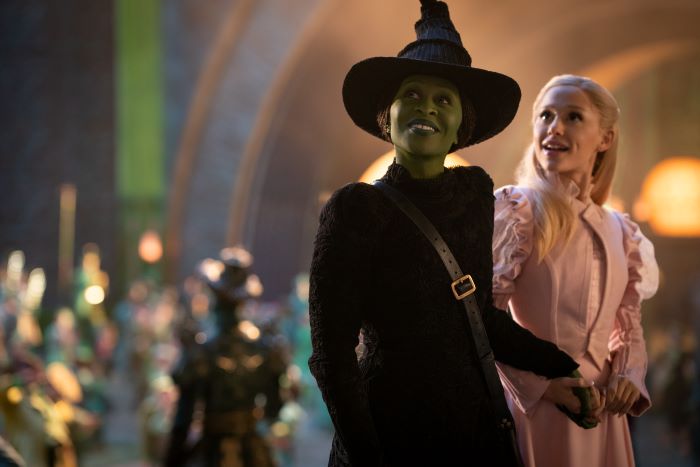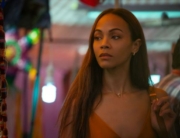It makes sense that composer Stephen Schwartz initially considered turning Gregory Maguire’s 1995 novel Wicked: The Life and Times of the Wicked Witch of the West into a movie before writing the score for the 2003 stage musical, Wicked. When I saw the Broadway production in 2018, it felt like going to the movies: The audience got up throughout the show, talked, and ate refreshments while the production glided along like a well-oiled machine, brisk but running on empty. There was little emotional resonance. However, director Jon M. Chu’s film adaptation has a brain, a heart, and the courage of its convictions. The exceptional performances, aided by the intimacy of close-ups, add depth and tension that defy grav-, I mean, expectations.
It’s a rare specimen: an unabashedly wholesome family musical with added appeal for tweens. Hollywood tried to capitalize on the success of Mary Poppins from 1964 and came up with Chitty Chitty Bang Bang, Bedknobs and Broomsticks, and Willy Wonka and the Chocolate Factory. Stuffed with state-of-the-art digital effects, Wicked joins their ranks and succeeds more so than other recent Broadway-to-screen transfers, like the leaden Les Misérables, by improving upon its source material, even if it’s padded out for a 160-minute running time and the storyline split in two. The second chapter is scheduled for release next year.
Though a bit bloated and overproduced—à la Hello, Dolly! and Camelot, to name two more ’60s musicals—Wicked never loses focus on the bumpy friendship between the green-skinned and ostracized Elphaba and the socially ambitious goody-two-shoes Galinda (Cynthia Erivo and Ariana Grande-Butera, respectively), both students and reluctant roommates at Shiz University, studying sorcery.
Novelist Maguire sympathetically expanded upon the character created by L. Frank Baum (whose initials begat “Elphaba”), crafting a dark origin tale that includes rape and murder. His inspirations seem less rooted in Baum’s works than in the 1939 MGM musical The Wizard of Oz, where Margaret Hamilton memorably played the cackling villainess in green body paint. Certainly, both the stage production and this film align more with that iconic movie. Writer Winnie Holzman, who liberally adapted Maguire’s novel for the stage, teams up with Dana Fox for the screenplay. The result tips its black, pointy hat to the 1939 movie in subtle ways, from the font in the opening credits to glimmers within its musical score. With much of the story set at a magical boarding school, it’s also hard not to draw comparisons to Harry Potter’s Hogwarts.
Although the screenplay retains the stage production’s plot elements, the story on screen feels even more like a fantastical, lighthearted combination of Beverly Hills, 90210 and the supernatural drama of Carrie, minus the blood. Even the orchestration of the score feels more like a remastered version of the original cast recording, though some songs are extended. The production design, on the other hand, features massive sets and seemingly hundreds of extras, an extravagance no stage could replicate. However, the fast-cut, razzle-dazzle editing often obscures rather than highlights the athletic choreography.
Another echo of the original stage production is Grande-Butera’s speaking voice, which uncannily resembles Kristin Chenoweth, the originator of Galinda, who later grandly changes her name to Glinda. Like her predecessor, she is delightfully daffy without any self-awareness. As the center of the emerging romantic tension between roommates Elphaba and Galinda, Jonathan Bailey (Bridgerton), as the charming Prince Fiyero, exudes enough playful sexual energy to bring the film perilously close to losing its PG rating. Erivo, as Elphaba, melts into the role subtly and unsentimentally, strategically deploying her Broadway belt. However, Chu undercuts her big number— “Defying Gravity”—by intercutting it with extended action sequences. This denies Erivo a big Barbra Streisand-style “Don’t Rain on My Parade” finale. It’s not quite a misstep but certainly a missed opportunity. Nevertheless, expect applause at the conclusion of that song, as well as after Erivo’s sensitive take on “The Wizard and I” and Grande-Butera’s delightfully romping through “Popular.”







Leave A Comment